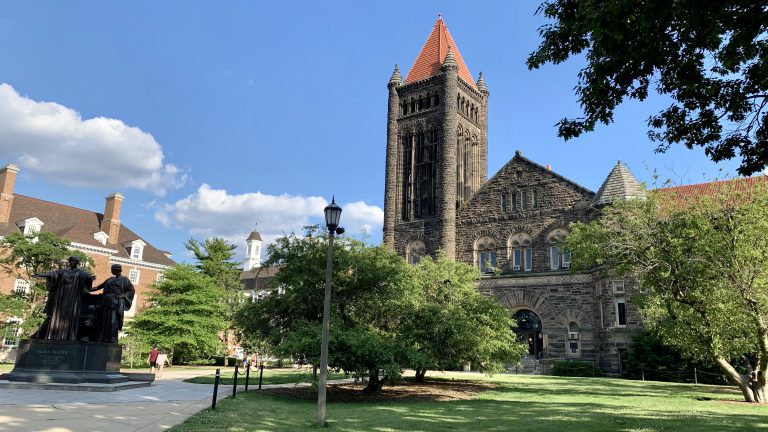URBANA – The University of Illinois system, including its campuses in Urbana, Springfield and Chicago, will welcome back tens of thousands of students this fall. In an announcement Thursday, university officials laid out plans to offer a mix of in-person and online instruction. The announcement comes days after staff at the U of I’s Urbana campus announced that the university had created a saliva COVID-19 test and planned to test more than 50,000 students who they expect to enroll and return to the campus this fall.
Thursday’s announcement includes a number of safety measures each campus intends to take to mitigate the spread of the virus, including requiring that students and staff wear masks in classrooms and other public spaces. Officials say masks will be provided by the university, and hand sanitizer will be widely available.
Residence halls will be limited to two students per room and outside visitors won’t be allowed. Dining halls will provide mostly packaged meals for carry-out, and the use of recreational facilities will be limited to maintain social distancing measures. Classrooms and other areas will be disinfected frequently, according to the university.
Most employees will return to work over the course of the summer, but some will continue to work from home to reduce the number of people on campus, according to the announcement. Officials say both staff and students will undergo training to comply with social distancing measures.
The university says they expect its COVID-19 test to be scalable to the institution’s entire community, and to provide same-day results.
But there are diverging views among campus faculty regarding the university’s plan. Bruce Rosenstock, a religion professor at the U of I’s Urbana campus, adamantly opposes bringing thousands of students back to the campus.
He calls the plan “a disaster of epic proportions.” Rosenstock is a member of the Campus Faculty Association, a group which claims about 200 tenured and tenure-track faculty among its membership. The group issued a statement last month urging the university to host classes online and to only allow a handful of students to return to the campus.
“I totally feel that what’s being planned will rebound against this university for years and years to come after this,” Rosenstock says. “The ripple effects of a super-spreader event will ripple through Urbana-Champaign and the state of Illinois, and we will be responsible for the deaths of tens and hundreds of people.”
Rosenstock also points to a university document dated May 20 and addressed to the dean of the Urbana campus’ College of Liberal Arts and Science — the largest college on that campus. The document lays out the recommendations of a task force appointed to create a plan for the fall semester in light of the pandemic. In one section titled “Student Risk Assessment,” the task force states that “we do not believe it is advisable to attempt in-person instruction with social distancing.” The document also states that a majority of faculty members in the college “fear returning to campus due to health and safety concerns, and therefore are planning to teach their courses and meet with their students in an online setting, regardless of which operational scenario we are under in Fall 2020.”
Nicholas Burbules, a professor at the Urbana campus’ College of Education, says every scenario comes with risks, and he believes the university’s plan balances those risks well.
In fact, Burbules says he believes some students may be safer on the Urbana campus than they would be remaining at home.
“There will be testing, there will be monitoring, there will be obviously all sorts of protection and masks and social distancing,” he says. “And many people won’t have access to that kind of support back in their homes or in their home communities, or in some cases, with international students, in their home countries.”
Burbules says some people may still contract the virus even with the precautions the university has planned. But he says there are also risks to consider if the university were to keep its campuses closed.
“Some students in certain areas, they have to be able to study on campus or in labs in order to really learn what they need to learn and in order to finish and graduate — whether they’re undergraduates or graduate students — and get on with their lives and careers,” Burbules says. “We can’t put everything on hold for a year. We can’t teach everything online for a year.”
Additionally, he says many faculty must be inside labs to conduct their research, and graduate student education relies heavily on working in those facilities.
Neither Burbules nor Rosenstock plan to teach any in-person classes next semester. Rosenstock says the CFA is advising its members to avoid campus as much as possible. Burbules says he had planned to teach online next semester regardless of the pandemic. Both men are over 65 years old and considered at higher risk for complications from the virus. Burbules says he also plans to continue working from home and minimize the time he spends on campus. He added that everyone should be provided with that opportunity.
“I think absolutely if someone does not feel safe being or working or teaching on campus, they shouldn’t be required to do it. And that goes for faculty and it goes for students as well,” Burbules says.
In their statement, university officials say “accommodations will be made where possible for students and faculty in vulnerable and at-risk groups, and for students who cannot come to campus due to travel restrictions or other considerations.”
Lee Gaines is a reporter for Illinois Public Media. Follow her on Twitter: @LeeVGaines

